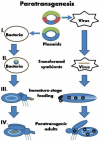Brazil's Innovative Approach: Engineered Mosquitoes Combatting Dengue Fever

In a groundbreaking initiative aimed at curbing the spread of dengue fever, scientists in Brazil have begun releasing specially engineered mosquitoes, a project that has drawn attention for its potential to transform public health strategies. The initiative, led by researchers at the Federal University of Rio de Janeiro, involves the release of genetically modified Aedes aegypti mosquitoes designed to reduce the population of disease-carrying insects. This project, funded by both governmental and international health organizations, hopes to mitigate the rising incidence of dengue, a mosquito-borne viral infection that has seen a dramatic increase in cases across Brazil in recent years.
The release of these genetically modified mosquitoes is part of a broader strategy to combat dengue fever, which infected more than 1.5 million people in Brazil in 2022 alone, according to the Ministry of Health. Dr. Ana Paula Oliveira, a leading entomologist at the Federal University of Rio de Janeiro, stated, "Our goal is to create a self-sustaining population of mosquitoes that carry a gene that reduces the viability of offspring, thereby gradually lowering the population of Aedes aegypti."
The project is not without controversy. Critics have raised concerns about ecological impacts and the ethics of releasing genetically modified organisms into the environment. Dr. João Mendes, an environmental scientist at the University of São Paulo, expressed caution, saying, "While the potential benefits are significant, we must thoroughly assess the ecological consequences of altering mosquito populations. We have limited understanding of how these genetically modified insects will interact with native species."
In response to these concerns, researchers have emphasized their commitment to rigorous monitoring and evaluation throughout the implementation phase. The World Health Organization (WHO) has endorsed the project, citing the urgent need for innovative solutions to tackle the global dengue crisis. According to a WHO report released in 2023, dengue fever has become endemic in many tropical and subtropical regions, with billions of people at risk.
The Brazilian government has also shown support for the initiative. Health Minister Dr. Maria Clara Silva stated, "This project represents a significant step forward in our fight against dengue fever. We are committed to exploring all viable options to protect our citizens from this devastating disease."
As part of the project's launch, scientists have been conducting community education programs to inform the public about the benefits and safety of the genetically modified mosquitoes. Community engagement is crucial, as public acceptance is key to the project's success. Residents of Rio de Janeiro have expressed mixed feelings, with some welcoming the initiative as a much-needed solution to a persistent health crisis while others remain skeptical.
This innovative approach to mosquito control is not unique to Brazil. Similar projects are underway in several countries, including the United States and Australia, where genetic modification technologies are being utilized to manage mosquito populations effectively. The global response to dengue fever has prompted increased funding and research into alternative methods of vector control.
Looking ahead, the Brazilian project could set a precedent for future public health strategies, particularly in regions severely affected by mosquito-borne diseases. If successful, the initiative may pave the way for broader applications of genetic engineering in combating infectious diseases. However, the path forward is fraught with challenges that require careful planning and community involvement.
In conclusion, as Brazil prepares to implement this innovative mosquito control initiative, the world watches closely. The potential implications for public health, environmental integrity, and community acceptance will be critical in determining the success of this pioneering endeavor. The future of dengue prevention may very well depend on the careful balance of science, ethics, and community trust.
Advertisement
Tags
Advertisement





